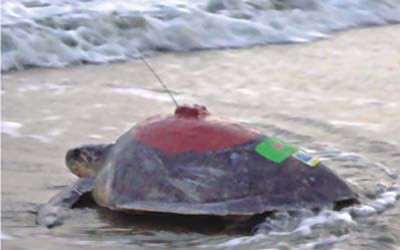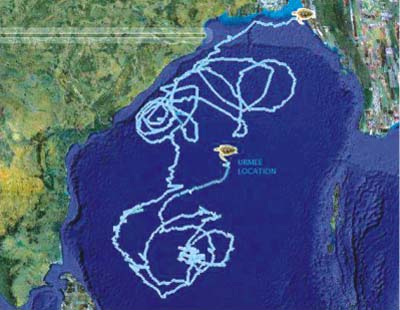The post 12,000km in 357 days appeared first on Dhaka Mirror.
]]> The first turtle that was tagged in Bangladesh with a satellite chip to track its journey last year has travelled over 12,000 kilometres in 357 days and is now coming back to Bangladesh coast from Sri Lanka.
The first turtle that was tagged in Bangladesh with a satellite chip to track its journey last year has travelled over 12,000 kilometres in 357 days and is now coming back to Bangladesh coast from Sri Lanka.Urmee, the name of the turtle, has crossed the path until March 23, 2011. It is now in the middle of the Bay of Bengal, 780 km east of the Chennai coast of India, 977 km northeast of the Sri Lankan coast, 662 km west of the Andaman and Nicobar Islands and 806 km southwest of its Sonadia Island release point, Marinelife Alliance sources say.
Marinelife Alliance, Bangladesh, a research organisation, has been working on marine turtle conservation since 2001. It set the satellite transmitter with the help of Mote Marine Lab, Duke University, WIDECAST of the USA.
The researchers of Bangladesh named the adult female Olive Ridley Urmee, tagged it with a small device called Platform Terminal Transmitter (PTT) and released it in Sonadia on March 29, 2010.
Urmee started heading back to the Bangladesh coast on February 22.
Before reaching the Sonadia shoreline, Urmee must dodge a wide danger zone as the Bangladesh coast is full of fishing fleets including various fishing gears like marine set bag net, drifting gill nets and commercial mechanised trawl net.
“Our main concern is how Urmee can overcome this danger zone to reach the Sonadia coast,” said M Zahurul Islam, key researcher of the Marinelife Alliance.
 Every year a significant number of sea turtles come back to Bangladeshi coast including Cox’s Bazar, St Martin’s Island and Sonadia for nesting.
Every year a significant number of sea turtles come back to Bangladeshi coast including Cox’s Bazar, St Martin’s Island and Sonadia for nesting.Adult turtles always go back to the same place for nesting where they were hatched and born. But researchers do not know much about their sea routes and destination except that they come back in September in Bangladesh coast for nesting.
“Sea turtles are ready for nesting when they are over 20 years old. In Bangladesh we found around 400 nests in the St Martin’s Island and Sonadia,” said Zahurul Islam.
“Urmee is coming back to Sonadia after her release one year ago. She was supposed to come back in September for nesting. We don’t know why she is coming back so late,” he added.
Researchers say this tracking will save thousands of migratory turtles from unpredictable fishing fleets. Every year a huge number of Olive Ridley and Green turtles are killed after being trapped in the fishing net as a bycatch of fish.
The Marine Alliance last year found 187 dead sea turtles along the St Martin’s and Sonadia coast. But the real number is much higher than that, officials say.
Once the migratory routes are known, different agencies like the navy, fisheries department and conservation authorities can take immediate action to designate and implement safe routes for the turtles, a species that plays a vital role to keep the sea environment clean.
“Urmee travelled to as far as the Sri Lankan coast and is now coming back to Bangladesh for nesting. It gives us valuable information that will be very helpful for researchers,” said Zahurul of Marinelife Alliance.
As sea turtles are air-breathing reptiles, they come up to the ocean surface every 30 to 40 minutes. The satellite device only receives signal from the transmitter set on its back when it comes up to the surface. The location and path of migration of the turtle can be determined by mapping these location points.
The technique holds great potential for unlocking many secrets of sea turtles’ behaviour and ecology, Zahurul said.
“We are expecting to bug some more turtles which could give us an idea on the range of areas the turtles travel from Bangladesh,” he added.
Courtesy of The Daily Star
The post 12,000km in 357 days appeared first on Dhaka Mirror.
]]>